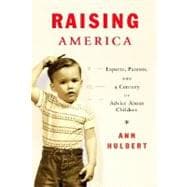
| Preface | p. ix |
| Introduction | p. 3 |
| The Birth of a Science | |
| The Century of the Child | p. 19 |
| Two Experts Grow Up | p. 41 |
| Infant Regimens, Adolescent Passions | p. 63 |
| Psychological Leaps | |
| The Era (and Errors) of the Parent | p. 97 |
| The Misbehaviorist | p. 122 |
| The Anatomist of Normalcy | p. 154 |
| Identity Crisis | |
| The Awkward Age of the Expert | p. 191 |
| The Therapist | p. 225 |
| The Moralists | p. 256 |
| Psychological Limits | |
| All in the Family | p. 293 |
| Ministers, Mentors, and Managers | p. 325 |
| Epilogue: What to Expect from the Experts | p. 360 |
| Notes | p. 371 |
| Acknowledgments | p. 435 |
| Photo Credits | p. 437 |
| Permissions Acknowledgments | p. 438 |
| Index | p. 439 |
| Table of Contents provided by Ingram. All Rights Reserved. |
The New copy of this book will include any supplemental materials advertised. Please check the title of the book to determine if it should include any access cards, study guides, lab manuals, CDs, etc.
The Used, Rental and eBook copies of this book are not guaranteed to include any supplemental materials. Typically, only the book itself is included. This is true even if the title states it includes any access cards, study guides, lab manuals, CDs, etc.
Excerpted from Raising America: Experts, Parents, and a Century of Advice about Children by Ann Hulbert
All rights reserved by the original copyright owners. Excerpts are provided for display purposes only and may not be reproduced, reprinted or distributed without the written permission of the publisher.